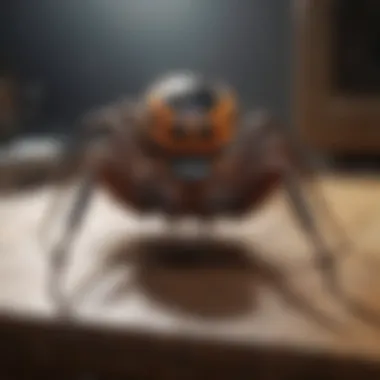Effective Spider Killing Solutions for Basements: A Comprehensive Guide


Preventive Pest Control Strategies
When it comes to keeping your basement spider-free, preventive pest control strategies play a crucial role. Starting with safeguarding the exterior of your house, ensure to seal any cracks or gaps that may serve as entry points for pests. Clearing debris and clutter around the perimeter of your home also helps deter unwanted critters from making their way inside. Implementing measures to prevent pests from entering, such as installing screens on windows and doors, can significantly reduce the likelihood of spider infestations.
In addition to focusing on the exterior, proper yard maintenance is essential for keeping spiders at bay. Establishing essential yard care routines, such as mowing the lawn regularly and removing standing water, can make your yard less attractive to pests. Employing methods like removing excess vegetation and debris will help maintain a pest-free outdoor environment.
Maintaining a clean indoor space is equally vital in spider prevention. Expert cleaning tips and techniques, such as vacuuming regularly and decluttering storage areas, can eliminate spider hiding spots and hinder their ability to thrive indoors. Creating a pest-resistant indoor environment by sealing food containers and cracks in walls can further deter spiders from taking up residence.
Efficient garbage disposal is another key aspect of pest prevention. Properly disposing of waste not only eliminates food sources for pests but also reduces the likelihood of attracting spiders and other unwanted visitors. Emphasizing the importance of correct garbage disposal practices, such as sealing trash bags tightly and promptly removing overflowing bins, can contribute to a pest-free basement environment.
To supplement these foundational strategies, exploring innovative pest prevention methods can add an extra layer of protection for your home. Implementing measures like utilizing ultrasonic devices or incorporating natural repellents can amplify your pest control efforts and contribute to a spider-free basement environment.
Identifying Pest Risk Areas
Inspecting areas prone to moisture accumulation is essential for identifying potential pest breeding grounds. By pinpointing damp conditions and taking steps to address them, such as repairing leaks and improving ventilation, you can mitigate the risk of a spider infestation in your basement. Regularly inspecting crackcontinue to next section
Introduction
Exploring the realms of natural remedies, chemical sprays, and professional services, this comprehensive guide aims to equip you, our housewife audience, with a deep understanding of the strategies and products at your disposal. By delving into the specific elements of spider killer options for basements, we can discern what works best for different scenarios, budgets, and preferences. This article serves as a beacon of knowledge, offering insight into the most effective ways to bid farewell to unwanted arachnid residents while considering the safety of your family and pets.
Understanding the Spider Infestation
In this article about the best spider killers for basements, understanding the spider infestation plays a crucial role in effectively combating these arachnids. By delving into the specifics of spider behavior and habits, homeowners can pinpoint areas where spiders are likely to thrive, laying the groundwork for targeted extermination methods. Understanding the spider infestation empowers individuals to take proactive measures to address the root causes of spider presence, leading to long-term success in eradicating these pests from their basements. Through this section, readers will gain valuable insights into the importance of recognizing and comprehending the nature of spider infestations, enabling them to make informed decisions on the most suitable spider killer strategies.
Identifying Common Spider Species in Basements


Identifying common spider species that frequent basements is a pivotal step in devising a comprehensive spider eradication plan. By familiarizing oneself with the distinguishing characteristics of spiders commonly found in basement environments, individuals can tailor their approach based on specific vulnerabilities and preferences of these species. Whether dealing with cellar spiders or black widows, understanding the nuances of each type equips homeowners with the knowledge needed to select the most effective spider killer product or method. Through careful observation and research, individuals can differentiate between harmless spiders and potentially dangerous ones, ensuring a targeted and efficient spider elimination strategy.
Factors Contributing to Spider Infestations in Basements
Various factors contribute to spider infestations in basements, necessitating a thorough assessment to effectively tackle the root causes. Issues such as moisture levels, lack of ventilation, or clutter provide ideal conditions for spiders to thrive and multiply. By addressing these contributing factors, homeowners can create inhospitable environments for spiders, deterring them from colonizing basements. Understanding the determinants of spider infestations enables individuals to implement preventative measures that not only eliminate existing spiders but also deter future infestations. Through proactive identification and mitigation of these factors, homeowners can significantly reduce the likelihood of persistent spider problems in their basements.
Natural Spider Repellents
In the realm of spider control, natural repellents offer a non-toxic and environmentally friendly alternative to traditional chemical sprays. Within the context of this article focusing on the best spider killers for basements, exploring the topic of Natural Spider Repellents is crucial for readers seeking effective yet gentle solutions for their spider infestations. Natural repellents are gaining popularity due to their safety for both inhabitants and the environment. They provide a way to combat spiders without introducing harmful chemicals into your living space, making them an attractive option for those striving for a more sustainable approach to pest control.
Considering the specific elements of Natural Spider Repellents, it's essential to highlight their non-toxic composition, making them ideal for households with children and pets. They offer a way to manage spider infestations without posing health risks to your loved ones. Additionally, natural repellents often come in pleasant fragrances derived from essential oils, creating a more inviting atmosphere in spaces where spiders tend to lurk. When discussing the benefits of Natural Spider Repellents in this article, emphasizing their efficacy in deterring spiders effectively is key. These repellents work by targeting a spider's senses, deterring them from entering treated areas. Moreover, they serve as a long-lasting solution, requiring less frequent reapplication compared to some chemical counterparts.
When delving into considerations about Natural Spider Repellents, addressing their limitations is important for readers to make informed decisions. While natural repellents can be highly effective in deterring spiders, they may not offer the immediate knockdown effect that some chemical sprays provide. As such, patience and consistency in application are crucial when opting for natural solutions. Additionally, the application method of natural repellents, such as sprays or diffusers, should align with the specific needs of your basement environment. By providing a nuanced exploration of Natural Spider Repellents' efficacy, benefits, and considerations, this article equips readers with the knowledge needed to decide on the most suitable approach for combating spiders in their basements.
Chemical Spider Killers
In the realm of combating spider infestations, chemical spider killers play a crucial role in eradicating these pesky arachnids efficiently. Chemical spider killers are formulated with potent ingredients that target spiders at various life stages, effectively exterminating them and preventing re-infestations. They offer a quick and often long-lasting solution to rid your basement of spiders. These products are designed to be powerful yet safe when used as directed, ensuring the safety of your household members.
When considering chemical spider killers, it is essential to assess their effectiveness, application methods, and safety precautions. Understanding the specific needs of your basement environment is vital in selecting the most suitable chemical spider killer for optimal results. Additionally, following the manufacturer's instructions meticulously is imperative to maximize the efficacy of the product while safeguarding your home and family.
Chemical spider killers come in various forms such as sprays, dust insecticides, and glue traps, each offering distinct advantages and considerations. By choosing the right chemical spider killer tailored to your requirements, you can effectively combat spider infestations and maintain a spider-free environment in your basement.
Insecticide Sprays
Insecticide sprays are a popular choice for targeting spiders in basements due to their convenience and immediate impact. These sprays contain potent chemicals that act quickly upon contact with spiders, immobilizing and exterminating them swiftly. They offer a targeted approach, allowing you to directly spray on spider-infested areas for effective results. While insecticide sprays are effective against spiders, it is essential to use them with caution to prevent accidental inhalation or skin contact. Ensure proper ventilation and adhere to safety guidelines when applying insecticide sprays to safeguard your health and the environment.


Dust Insecticides for Long-lasting Protection
Dust insecticides provide long-lasting protection against spiders by creating a barrier that spiders avoid or come into contact with, leading to their demise. These products are ideal for areas that are challenging to reach with sprays, offering extended coverage and residual effects. Dust insecticides work by clinging to the spiders' bodies as they crawl through treated surfaces, effectively eliminating them over time. When using dust insecticides, it is crucial to apply them in hidden or secluded areas where spiders tend to dwell, ensuring comprehensive coverage and targeted extermination.
Spider Glue Traps
Spider glue traps are non-toxic alternatives for capturing spiders without using chemical substances. These traps feature adhesive surfaces that trap spiders as they move across them, preventing their escape. Spider glue traps are easy to use and provide a discreet method of controlling spider populations in basements. They are safe to place in various locations and are suitable for monitoring spider activity over time. Spider glue traps offer a non-invasive approach to dealing with spiders, making them a popular choice for households looking to avoid chemical interventions while effectively managing spider infestations.
Preventive Measures
Preventive measures play a crucial role in effectively managing and preventing spider infestations in your basement. By implementing strategic practices, you can create an environment that is less hospitable to spiders, reducing the risk of infestations. These measures not only eliminate existing spiders but also act as a deterrent against future intrusions, helping maintain a spider-free basement over the long term.
Implementing preventive measures is essential for long-term spider control in your basement. By proactively addressing potential entry points and factors that attract spiders, you can create an inhospitable environment for them, minimizing the likelihood of infestations. Consistent application of preventive strategies forms a key part of integrated pest management approaches, ensuring a holistic and sustainable solution to spider-related issues.
Sealing Cracks and Crevices
One of the primary ways spiders enter basements is through cracks and crevices in walls, floors, and foundations. Sealing these openings is a critical preventive measure that helps block main entry points for spiders. By meticulously examining the basement for any gaps or holes, you can identify potential entryways for spiders and other pests.
Sealing cracks and crevices effectively entails using appropriate materials such as silicone caulk or weatherstripping to fill in gaps and prevent spider access. Pay close attention to areas where pipes, cables, and vents enter the basement, as these are common entry points for spiders. By diligently sealing off these openings, you can reduce the chances of spiders infiltrating your basement and nesting in hidden areas.
Reducing Clutter in the Basement
Clutter provides ideal hiding spots for spiders, offering them shelter and protection from predators. By decluttering the basement and removing unnecessary items, you eliminate potential harborage sites for spiders. Minimizing clutter not only reduces hiding places for spiders but also makes it easier to spot any signs of infestations, enabling prompt action.
Reducing clutter in the basement involves organizing storage areas, disposing of unused items, and maintaining cleanliness throughout the space. By keeping the basement well-organized and free of unnecessary objects, you create a less attractive environment for spiders to inhabit. Regular decluttering activities, such as donating unwanted items and proper storage management, contribute to a spider-resistant basement.


Regular Cleaning and Decluttering
Regular cleaning practices are essential for preventing spider infestations and maintaining a hygienic basement environment. Dust, debris, and clutter provide ideal breeding grounds and hiding spots for spiders. By incorporating routine cleaning into your maintenance schedule, you not only remove existing cobwebs and debris but also discourage spider activity in the space.
Regular cleaning and decluttering encompass sweeping floors, dusting surfaces, vacuuming corners, and removing spider webs from walls and ceilings. Thorough cleaning efforts help eliminate egg sacs, spider webs, and prey items, disrupting the spider's lifecycle and population growth. By maintaining cleanliness in the basement, you promote a less favorable habitat for spiders, reducing the likelihood of infestations and promoting a healthier living environment.
Professional Extermination Services
Professional extermination services play a pivotal role in eradicating stubborn spider infestations effectively and efficiently. In the realm of spider control, these services offer a specialized approach tailored to vanquishing spiders from the depths of basements, where these arachnids tend to thrive. By enlisting the expertise of pest control professionals, homeowners can rest assured that their basement will be thoroughly inspected, treated, and monitored to ensure a spider-free environment for the long haul.
Importance of Professional Extermination Services
The significance of opting for professional extermination services lies in their in-depth knowledge of spider behavior, breeding patterns, and common hiding spots within basements. Pest control professionals are equipped with the expertise to identify the exact species of spiders infesting a basement, enabling them to devise a targeted extermination strategy that is both potent and precise. Unlike generic spider killers available in stores, professional services offer a customized approach that addresses the specific needs of each infestation, maximizing effectiveness and minimizing the chances of a recurrence.
Elements and Benefits of Professional Extermination Services
Professional extermination services encompass a holistic approach to spider control, encompassing thorough inspections, precise treatment plans, and ongoing monitoring to ensure long-term eradication. These services typically involve the use of advanced pest control techniques and products that are not readily accessible to consumers, ensuring a higher success rate in eliminating spiders from basements. Moreover, professional exterminators prioritize the safety of residents and pets, employing methods that are both potent against spiders and environmentally friendly.
Considerations for Professional Extermination Services
When considering professional extermination services for spider control in basements, homeowners should factor in the reputation and experience of the pest control company. Choosing a reputable service provider with a proven track record of successful spider exterminations is essential to achieving optimal results. Additionally, homeowners should inquire about the types of treatments used, ensuring that they align with personal preferences regarding eco-friendliness and safety.
In summary, professional extermination services stand out as a reliable and effective solution for combating persistent spider infestations in basements. With their specialized knowledge, tailored approach, and advanced techniques, pest control professionals offer a comprehensive remedy that goes beyond what conventional spider killers can provide. By investing in professional services, homeowners can bid farewell to unwelcome eight-legged intruders and enjoy a spider-free basement once and for all.
Conclusion
The conclusion serves as the cornerstone that consolidates all the information provided, offering readers concrete takeaways and actionable insights. By summarizing the key points discussed throughout the article, the conclusion not only reinforces the main ideas but also provides a succinct yet comprehensive overview of the strategies and products highlighted.
One of the key benefits of the conclusion is its ability to serve as a quick reference guide for readers looking to implement the recommended spider-killing techniques. It acts as a strategic roadmap, outlining a step-by-step approach that individuals can follow to address their specific spider infestation issues in basements. Furthermore, the conclusions drawn also shed light on the importance of consistency and persistence when dealing with spider problems, underscoring the need for a multifaceted approach that combines different strategies for optimal results.
Additionally, the conclusion touches upon the pros and cons of each method discussed, allowing readers to make informed decisions based on their preferences, budget, and environmental concerns. It emphasizes the importance of taking a tailored approach that aligns with individual needs and circumstances, ensuring that readers can choose the most suitable spider killer for their specific situation.
In essence, the conclusion serves as a critical wrap-up that not only summarizes the key findings but also empowers readers to take proactive steps towards eradicating spider infestations in their basements. By distilling complex information into actionable insights, the conclusion solidifies the practicality and effectiveness of the solutions presented throughout this comprehensive guide.



